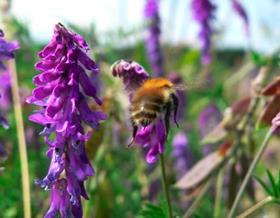
Growers are being denied a crucial tool due to the European Commission’s ban of three neonicotinoids, according to Dr Stephen Humphreys, a food industry manager at Bayer CropScience.
Speaking to FPJ at last week’s Fruit Focus event in East Malling, Humphreys said that an anti-chemical agenda has incorrectly portrayed the controversial chemicals as a danger to bees.
“All tests under normal field conditions show no negative impact on the health of bees; what we have seen is the glorification of research done in a laboratory with exaggerated dose rates,” claimed Humphreys.
According to Humphreys, Bayer CropScience, one of the suppliers behind the three banned chemicals, has had its name unfairly smeared in the media, and neonicotinoids, when used correctly, pose “no threat” to the health of pollinators.
He added: “People don’t realise we have been a bee health company for 25 years. We are actively researching varroa control agents to help beekeepers as it is the varroa mite responsible for the decline in populations, not neonicotinoids. In Australia they have been using neonicotinoids for 20 years and have the healthiest bees in the world. Why? Their agri-climate has no varroa mites.”
Varroa is an external parasitic mite that attacks honeybees, leaving them susceptible to a host of infections. Humphreys’ views were echoed by Jerry Hayes of US agri-science firm Monsanto at its recent Honey Bee Health Summit.He claimed: “If we could control varroa mites, I’m positive that we could improve honeybee health globally by 70 to 80 per cent.”
However, despite the likes of the NFU actively lobbying against the EU neonicotinoids ban, The Soil Association remains insistent that it was the right decision. Its head of policy Emma Hockridge said: “With the two-year moratorium on the use of key neonicotinoids in agriculture, we are finally beginning to protect our bees.”
The British Beekeepers Association estimates that the number of bee colonies fell by 16 per cent last year.



